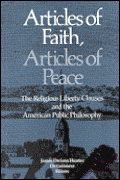Freedom of Religion—protected in America for two hundred years by the Bill of Rights—has become more a source of divisiveness than the binding force it used to be in American life. Abortion, school prayer, creation science, and secular humanism are a few examples of the conflict between religious liberty and public justice that arise today.
Articles of Faith, Articles of Peace examines the contemporary challenges to religious liberty and explores ways in which the public philosophy can be reinvigorated. Steering between the extremes of a “sacred public square,” in which any one faith is established or preferred, and a “naked public square,” from which all faiths have been removed, the authors argue for, and exemplify, a civil public square. And they try to answer the vital question: how do we, in an age of expanding worldwide pluralism, live with our deepest, religiously intense, differences.
Peter L. Berger, Harold J. Berman, Os Guinness, James Davidson Hunter, William Lee Miller, Michael J. Sandel, and Charles Taylor are the distinguished contributors to this book who speak from different academic disciplines and diverse personal perspectives. Their concerns converge in this dynamic and thought-provoking discussion important to every American. The authors acknowledge that American pluralism has grown beyond the traditional “Protestant-Catholic-Jew” into a genuine multifaith pluralism, and that religious liberty entails the freedom to dissent as well as to believe.
Articles of Faith, Articles of Peace is a proposal and discussion that carries great promise for the pressing problems of religion in American public life. The vision of a civil public square, and a common goal for common good, offers a way for American diversity to remain a source of strength and richness. Only with such commitments will democratic debate remain robust and religious liberty remain a component of a vital democracy.
Authors
Edited by

